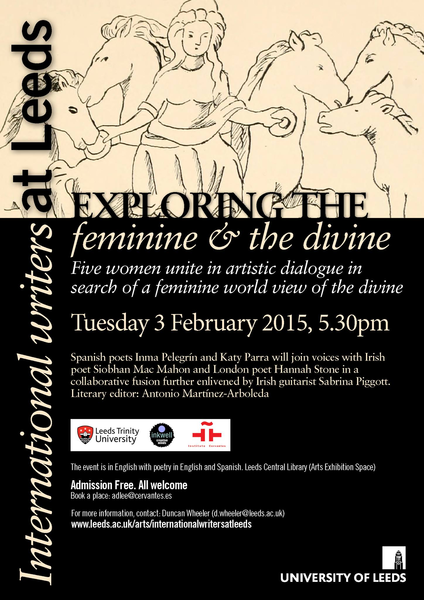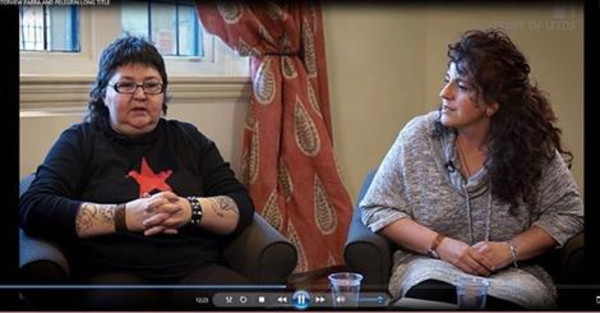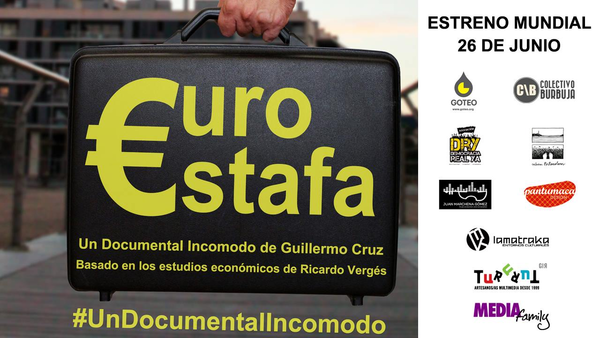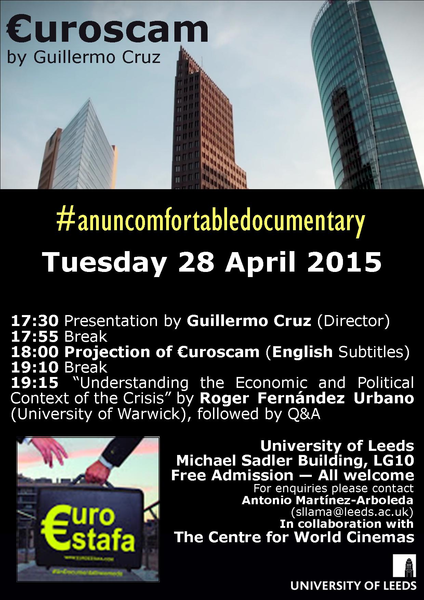Items where Year is 2015
 | Up a level |
Jump to: Resource | Collection
Number of items: 40.
Resource
Introduction to ethnographic methods
Shared with the World by Dr Lisa Bernasek
These are the materials from a session introducing ethnographic research methods for PGR students at the University of Southampton. They could also be adapted for use with undergraduates. The slides give an overview of key principles and steps in carrying out an ethnographic project, and the handout allows for individual reflection and planning.
Shared with the World by Dr Lisa Bernasek
Organising a conference
Shared with the World by Dr Lisa Bernasek
These are the materials from a training session on organising a conference for PGR students at the University of Southampton. The slides give introductory information on the steps and process of organising a conference, and the handout allows students to practice planning their own conference.
Shared with the World by Dr Lisa Bernasek
The Most Expensive Suite In The World
Shared with the World by Mr Angelos Bollas
This is an EFL lesson for intermediate level learners. It offers practice in reading, writing, and grammar/vocabulary work through text.
Shared with the World by Mr Angelos Bollas
IEREST on Humbox - User guide
Shared with the World by Ana Beaven
This user guide explains how to download and upload resources associated with IEREST
Shared with the World by Ana Beaven
IEREST Module 1 - Exploring narrative in intercultural mobility contexts
Shared with the World by Ana Beaven
The aim of this activity is to explore in depth narratives in the context of intercultural mobility, and more specifically, of study-abroad experiences. In this activity, students explore examples of narratives and confront the challenges and questions surrounding them within their own (future, present or past) Erasmus mobility perspective.
Shared with the World by Ana Beaven
IEREST - Intercultural Education Resources for Erasmus Students and their Teachers
Shared with the World by Ana Beaven
This is the manual containing the ten teaching resources
Shared with the World by Ana Beaven
IEREST - Overview of Modules and Activities
Shared with the World by Ana Beaven
This slide shows an overview of the three modules and ten activities that make up the IEREST Intercultural Path designed for students taking part in study abroad.
Shared with the World by Ana Beaven
IEREST Module 1 - Anti-discrimination study circle
Shared with the World by Ana Beaven
This activity encourages students to reflect on discrimination and how it can touch upon everyone through implicit or explicit processes. In this activity students first discuss their own experiences of discriminatory practices in their own environment and elsewhere. Then, through the series of tasks, they are gradually guided to analyse discourses of discrimination in the media (TV news and the Internet) by deconstructing images of otherness, which are often conveyed by specific language choices. The ultimate objective is to enable students to apply what has been presented and discussed within the study circle of the class to their own explorations of discriminatory events/texts/images in their own lives and communities, and in the context of their future study abroad.
Shared with the World by Ana Beaven
IEREST Module 1 - Meeting others abroad
Shared with the World by Ana Beaven
The activity is related to the goal of reflecting on what it means to engage with others during a stay abroad. It helps students refrain from creating categories of ‘desirable’ and ‘undesirable’ others, reflecting on the idea that all people are potentially interesting and worth meeting. The activity also aims at encouraging students to engage with other mobile students, for instance by having former mobile students share experiences with new mobile students.
Shared with the World by Ana Beaven
IEREST Module 1 - Perceptions of self and other
Shared with the World by Ana Beaven
This activity invites the students to explore the concept of ‘multiple identities’ and to consider how it is related to intercultural communication. This concept is considered fundamental in view of an experience abroad. In addition, terms such as ‘co-constructed’, ‘negotiated’, ‘ascribed’, ‘contested’ identities will be introduced at the beginning of the activity and then practised in the four tasks, in order to provide the students with the appropriate language to articulate the concepts introduced. It will be in the light of these concepts that other more common terms are reconsidered, namely those of ‘stereotype’, ‘prejudice’, ‘essentialism’, and ‘ethnocentrism’.
Shared with the World by Ana Beaven
IEREST Module 1 - Slides
Shared with the World by Ana Beaven
These are the slides accompanying Module 1 of the IEREST (Intercultural Education Resources for Erasmus Students and their Teachers) resources. They provide some theoretical support for the 4 pre-departure activities.
Shared with the World by Ana Beaven
IEREST Module 1 Introduction
Shared with the World by Ana Beaven
This is the introduction to the activities in Module 1 (the pre-departure module). It gives an overview of the three activities and the learning objectives of the module.
Shared with the World by Ana Beaven
IEREST Module 2 - 24h Erasmus life
Shared with the World by Ana Beaven
This activity is designed to encourage students to reflect on their actual Erasmus experiences along four complementary themes: (1) the emotional dimension of living abroad; (2) their social contacts within the Erasmus community as well as with local students/people; (3) the academic life in the host institution; and (4) their language experiences.
Shared with the World by Ana Beaven
IEREST Module 2 - Intercultural geography
Shared with the World by Ana Beaven
This activity is designed to help students reflect on how their host environment - the place or region, its neighbourhoods, the university, etc. - has been shaped by its history and culture(s), by the activities and interactions of the communities who live there and by the way they occupy and use the spaces available to them. The tasks within the activity are intended to encourage students to compare their own experience and perception of the host environment with those of others, namely those of both other students and more permanent residents.
Shared with the World by Ana Beaven
IEREST Module 2 - Slides
Shared with the World by Ana Beaven
These are the slides accompanying Module 2 of the IEREST (Intercultural Education Resources for Erasmus Students and their Teachers) resources. They provide some theoretical support for the 3 while-abroad activities.
Shared with the World by Ana Beaven
IEREST Module 2 Introduction
Shared with the World by Ana Beaven
This is the introduction to the activities in Module 2 (the while abroad module). It gives an overview of the three activities and the learning objectives of the module.
Shared with the World by Ana Beaven
IEREST Module 2- Experiencing (interculturality through) volunteering
Shared with the World by Ana Beaven
This activity offers Erasmus students the opportunity to obtain intercultural experience in a volunteering organisation in the host society. The students engage in intercultural dialogue with the local population and develop communication capabilities in potentially multiple languages and contexts. Also, volunteering increases social and job skills, which may considerably enhance students’ employability. Thus students gain experience of intercultural communication in the workplace. This activity engages Erasmus students in critical intercultural reflection through journal writing and practical fieldwork in an organisation.
Shared with the World by Ana Beaven
IEREST Module 3 - Bringing interculturality back home
Shared with the World by Ana Beaven
This activity responds to the needs of students returning from study abroad to reflect on their experiences and share these with others, as well as to help future mobile students. Here, Erasmus students are asked to consider how they translate their experience (intercultural or otherwise) into self-representation, and how they can help future Erasmus exchange students to reflect on their pre-departure expectations.
Shared with the World by Ana Beaven
IEREST Module 3 - One, two, many… Erasmus experiences
Shared with the World by Ana Beaven
This activity invites students to look back critically on how they talk about their Erasmus experience with other people once they have returned home. As other narrators, students will tend to construct different narratives for different audiences. This does not imply, however, that one ‘version’ of an episode is more or less ‘true’ than another.
Shared with the World by Ana Beaven
IEREST Module 3 - Slides
Shared with the World by Ana Beaven
These are the slides accompanying Module 3 of the IEREST (Intercultural Education Resources for Erasmus Students and their Teachers) resources. They provide some theoretical support for the 3 upon-return activities.
Shared with the World by Ana Beaven
IEREST Module 3 - Student mobility beyond the academy
Shared with the World by Ana Beaven
The purpose of this activity is to have students address the question “What have I got from my Erasmus experience that is not strictly related to my academic career?”. Specifically, this breaks down into two broad foci. The first two tasks concern the theme of citizenship, and ask students to reflect on how they may view themselves as global citizens as a result of their study abroad, and on what European citizenship may mean to them. The second theme revolves around how mobility is perceived in the professional world, what skills the students have acquired from the Erasmus experience, and how they can communicate those gains to future employers.
Shared with the World by Ana Beaven
IEREST Module 3 Introduction
Shared with the World by Ana Beaven
This is the introduction to the activities in Module 3 (the post-return module). It gives an overview of the three activities and the learning objectives of the module.
Shared with the World by Ana Beaven
IEREST dans Humbox: guide de l’utilisateur
Shared with the World by Ana Beaven
Ce document explique comment accéder aux resources IEREST dans Humbox
Shared with the World by Ana Beaven
IEREST en Humbox: Manual de usuario
Shared with the World by Ana Beaven
Este manual explica como utilizar Humbox para acceder a las actividades IEREST
Shared with the World by Ana Beaven
IEREST op Humbox: Handleiding
Shared with the World by Ana Beaven
Dit is de handleiding die u ondersteunt bij het gebruik van de IEREST-materialen op Humbox.
Shared with the World by Ana Beaven
IEREST slides - References
Shared with the World by Ana Beaven
These slides contain the bibliographic references for the three sets of IEREST slides accompanying the manual.
Shared with the World by Ana Beaven
Huir de las cenizas para caer en las brasas:
La inmigración española a Inglaterra
Shared with the World by Miss Lucie England-Duce
Utilizando las historias de Juan Luis Hernández (2015) y Javier Zaragoza (2013) e incorporando información desde recursos de periódicos también, el propósito de este documental es mostrar experiencias de primera mano sobre la emigración a Inglaterra e informar a una audiencia española.
Este documental podría ser escuchado por una audiencia general de hispanohablantes, pero se dirige específicamente a los españoles con menos de 30 años que tienen titulaciones y que están considerando emigrar al Reino Unido.
El documental fue producido como parte de la asignatura "Discovering Spanish Voices Abroad in a Digital World (OpenLIVES)", de la Universidad de Leeds.
An open collection of research data and teaching materials relating to Spanish migrant stories. JISC. University of Leeds
England-Duce, L., Jessup, C., and Hernandez, J. Entrevista OpenLIVES with Juan Luis. OpenLIVES project (2015).
Attributions: Abreu, J., Greenway J., Lillywhite, K., Morgan, L., Richardson, J., Steel, A., Wilson, J., Wright, D. and Zaragoza, J. 2013. Entrevista OpenLIVES with Javier Zaragoza. OpenLIVES project (2013). An open collection of research data and teaching materials relating to Spanish migrant stories. JISC.
Shared with the World by Miss Lucie England-Duce
IEREST - Modulo 1, Actividad 1 - Anexos
Shared with the World by Dr Irina Golubeva
Son los Anexos usados durante el taller dedicado a la Actividad 1, Modulo 1 de IEREST
Shared with the World by Dr Irina Golubeva
IEREST Modulo 1 - Las percepciones del "Yo" y del "Otro"
Shared with the World by Dr Irina Golubeva
Es una presentación PowerPoint de la actividad IEREST (Módulo 1 para los estudiantes que se preparan para una mobilidad académica). El taller está planeado para 1 hora y media.
Shared with the World by Dr Irina Golubeva
Learner Engagement with eAssessment Practices (LEeAP)
Shared with the World by Dr Zoe L Handley
Slides from ALT-C presentation and draft of paper for submission to ALT-C introducing a framework for engaging learners with computer-based assessment based on survey and focus group data.
Shared with the World by Dr Zoe L Handley
What is oral fluency?
Shared with the World by Dr Zoe L Handley
Exploring the relationship between cognitive and utterance fluency.
Shared with the World by Dr Zoe L Handley
Redes sociales, ¿redes de seguridad? Las comunidades y Internet en las experiencias de la emigración
Shared with the World by Ms Catherine Jessup
Este documental, creado como parte de un proyecto estudiantil de la Universidad de Leeds, indaga sobre el papel de las comunidades y la tecnologia en la experiencia de la emigración. Investiga estos temas a través de extractos de entrevistas con tres emigrados espanoles que viven en la ciudad de Leeds, Inglaterra. Compara estas narrativas con extractos de publicaciones en varias redes sociales y comunidades digitales escritas por emigrantes españoles, para ver las interacciones entre las comunidades virtuales y las narrativas individuales. Utiliza elementos del modo ‘participativo’ y del ‘reflexivo’ de Nichols, tratando los temas de los métodos de investigación del estudiante y del proyecto OpenLIVES. El documental fue producido como parte de la asignatura "Discovering Spanish Voices Abroad in a Digital World (OpenLIVES)", de la Universidad de Leeds.
Attributions: Abreu, J., Greenway J., Lillywhite, K., Morgan, L., Richardson, J., Steel, A., Wilson, J., Wright, D. and Zaragoza, J. 2013. Entrevista OpenLIVES with Javier Zaragoza. OpenLIVES project (2013). An open collection of research data and teaching materials relating to Spanish migrant stories. JISC. University of Leeds
Abreu, J., Gállego, L., Greenway J., Lillywhite, K., Morgan, L., Richardson, J., Steel, A., Wilson, J., and Wright, D. 2013. Entrevista OpenLIVES with Lara Gallego. OpenLIVES project (2013). An open collection of research data and teaching materials relating to Spanish migrant stories. JISC. University of Leeds
England-Duce, L., Jessup, C., and Hernandez, J. Entrevista OpenLIVES with Juan Luis. OpenLIVES project (2015). An open collection of research data and teaching materials relating to Spanish migrant stories. JISC. University of Leeds
With thanks to Batchelor, F., Curnock, I., Floyd, R. and Schmidt, E. who voice-acted extracts from the following online posts:
Anonymous Facebook users (2015). Posts from Españoles en Leeds. [Facebook posts].
Anonymous users of 'no nos vamos, nos echan' (no publication date). Posts from 'no nos vamos, nos echan'.
Rosella, M. (2012) Blog posts from 'Viviendo Abroad'.
Shared with the World by Ms Catherine Jessup
Exploring the Feminine and the Divine - Explorando lo femenino y lo divino
Shared with the World by Mr Antonio Martínez-Arboleda
Spanish poets Inma Pelegrín and Katy Parra join their voices with Irish poet Siobhan Mac Mahon and London poet Hannah Stone in this International Writers at Leeds event. The artists celebrate life and light alongside their exploration, through poetic dialogue, of how the feminine consciousness is embodied and expressed in relation to divinity. Music by Irish guitarist Sabrina Piggott. Translations and final poetic collage (using exclusively verses by the 4 poets) by Antonio Martínez-Arboleda (University of Leeds). The video contains original poems in English and Spanish as well as some translations. The event took place at Leeds Central Library on 3 February 2015. With thanks to Leeds Trinity University, Instituto Cervantes of Leeds and Manchester, Leeds Central Library, School of Modern Languages and Cultures (University of Leeds) and Transforming with Poetry at Inkwell. This resource includes poster of the event, the video file, link to youtube and text advertising the event in English with references and links to Hannah Stone, Katy Parra, Inma Pelegrín and Siobhan Mac Mahon.
Shared with the World by Mr Antonio Martínez-Arboleda
Interview to Spanish Poets Inma Pelegrín and Katy Parra
Shared with the World by Mr Antonio Martínez-Arboleda
Interview in Spanish: Award-winning Spanish Poets Inma Pelegrín and Katy Parra are interviewed at the University of Leeds by Dr Diana Cullell, Lecturer at the University of Liverpool (Iberian and Latin American Studies). During the interview Inma Pelegrín and Katy talk about the current state of poetic production in Spain, the connections with political changes in Spain, socially committed poetry, cultural policy, accessibility of poetry, meaning in poetry and language learning and poetry. They also talk about their own poetry and their influences. The interview took place on the 3 February 2015.
Inma Pelegrín is the winner of the prestigious literary awards “Premio Hispanoamericano de Poesía Juan Ramón Jiménez 2012” and “Premio Internacional de Poesía Gerardo Diego 2007”. Inma's poetry is fresh and direct yet distinctively sublime. She is a poet of immense emotional intelligence and linguistic talent, as she can arouse the most nuanced feelings in the reader by using familiar and colloquial language, which she seamlessly transforms into poetic gold. Her latest work includes Universo improbable (2009) Trapos sucios (2008), Óxido (2008) and Cuestión de horas (2012) Katy Parra is a literary activist and poet who has published extensively since 1997. In 2008 she won the International Poetry Award dedicated to Miguel Hernández. Her poetry sits comfortably along those unique voices in Spanish poetry who have managed to put the most exquisite formal poetic demands at the service of clarity, subtle irony and unexpected eroticism. Katy is the author of Coma Idílico (2008), Por si los pájaros (2008) and La manzana o la vida (2013).
Inma Pelegrín and Katy Parra visited the University of Leeds to participate in the International Writers at Leeds event held on the 3rd February 2015 at Leeds Central Library. The event "Exploring the Feminine and the Divine" also featured poets Siobhan Mac Mahon and Hannah Stone, guitarist Sabrina Piggot and Antonio Martínez-Arboleda (University of Leeds- Spanish, Portuguese and Latin American Studies) as literary editor and translator.
Shared with the World by Mr Antonio Martínez-Arboleda
€uroestafa (€uroscam)
Shared with the World by Mr Antonio Martínez-Arboleda
Was the Financial Crisis in Spain different from anywhere else in Europe? What was its social impact? What can we learn from it? This documentary by Guillermo Cruz is based on new research on the origins of the Spanish Housing and Construction Bubble, connecting it with political and economic events elsewhere in Europe. It is in Spanish with subtitles in English (click on the top left corner of the screen for subtitles). This resource is used in Spanish Final Year modules at the University of Leeds: Spanish in an Economics and Business Context and Contemporary Spain: From Franco to Zapatero (1975-2010). It contains the official poster of the launch of the film in 2014, a link to the film, which has a CC BY-NC-SA licence, as it was crowd-funded, in Youtube, the full transcript of the documentary and the translation of the script made by Antonio Martinez-Arboleda.
PRODUCCIÓN: MEDIA FAMILY, tururut art infogràfic, Guillermo Cruz, Ricard Vergés
DIRECCIÓN: GUILLERMO CRUZ
INVESTIGACIÓN: RICARD VERGÉS
GUIÓN: GUILLERMO CRUZ, RICARD VERGÉS
AYUDANTE DE DIRECCIÓN: GAIZKA ALTUNA
OPERADORES DE CÁMARA: GAIZKA ALTUNA, GUILLERMO CRUZ, RAÚL DE LA MORENA, ÒSCAR XAVIER GC
MONTAJE: GUILLERMO CRUZ, BRUNO PALAZÓN-ARNAUD
POSTPRODUCCIÓN: ÒSCAR XAVIER GC tururut art infogràfic
MÚSICA: JUAN MARCHENA GÓMEZ
VOZ EN OFF: XAVIER MAYANS
COMUNICACIÓN: ANTONIA CRUZ, SONIA FERNÁNDEZ, CRISTINA MANGAS, JORDI MARTÍNEZ
COMMUNITY MANAGER: JORDI MARTÍNEZ
Shared with the World by Mr Antonio Martínez-Arboleda
Guillermo Cruz, director of €uroestafa, presents his film at the University of Leeds
Shared with the World by Mr Antonio Martínez-Arboleda
€uroscam, #anuncomfortabledocumentary. This is the presentation given by Guillermo Cruz at the University of Leeds on the 28 April 2015, during the premiere of his film €uroestafa in the UK. It is in Spanish with consecutive translation into English. The interpreter and organiser of the event is Antonio Martínez-Arboleda, Principal Teaching Fellow in Spanish in the School of Languages, Cultures and Societies of the University of Leeds. This resource contains poster of the event, link to the mymedia video presentation and link to the Prezi presentation. With thanks to funding for the production of Open Educational resources from the HumBox project. The event was also supported by The Centre for World Cinemas of the University of Leeds. Creative Commons Licence 3.0 BY-NC-SA. Copyright University of Leeds. 2015
Shared with the World by Mr Antonio Martínez-Arboleda
Understanding the Economic and Political Context of the Spanish Crisis
Shared with the World by Mr Antonio Martínez-Arboleda
Economist Roger Fernández Urbano (University of Barcelona and University of Warwick) discusses the reasons behind the Spanish Financial Crisis and the Housing Bubble, in the premiere in the UK of the documentary €uroestafa (€uroescam) by Guillermo Cruz. This resource includes the poster of the event, mymedia video presentation plus ppt slides. With thanks to HumBox Project for OER production for funding. Also supported by the Centre for World Cinemas. Creative Commons Licence 3.0 BY-NC-SA. Copyright University of Leeds. 2015
Shared with the World by Mr Antonio Martínez-Arboleda
Langsnap Guide 1:Being an International Student
Shared with the World by Dr L. Patricia Romero de Mills
The key objective of the Langsnap Guides is to provide resources and materials for programme administrators and for study abroad participants. This first guide is focused on preparing students for a period of study abroad. It covers the following aspects:
a) Adapting to unpredictable administrative and organizational differences
b) Assessment and expectations of what an undergraduate student “should know”
c) Studying complex topics in a foreign language
d) Dealing with emotions related to this aspect of their experience.
A suggested lesson plan for this guide is provided in the "notes" section of the Power Point.
Note: You are welcomed to download and edit the materials in any way you need. But we would be very grateful if you could please acknowledge the authorship of Langsnap team in the presentation, and in your modified version. If you time, we would love to hear your comments and feedback. Feel free to leave us a message or contact me (Patricia) at: P.Romero@soton.ac.uk.
Thank you.
Shared with the World by Dr L. Patricia Romero de Mills
Collection

IEREST - Modulo 1, Actividad 1
Shared with the World by Dr Irina Golubeva
Son los materiales para conducir el taller sobre Actividad 1, Modulo 1 de IEREST.
Shared with the World by Dr Irina Golubeva
![[img]](http://www.humbox.ac.uk//4507/1.hassmallThumbnailVersion/poster_evento_final.jpg)

![[img]](http://www.humbox.ac.uk//4508/2.hassmallThumbnailVersion/Inma_y_Katy.jpg)

![[img]](http://www.humbox.ac.uk//4504/8.hassmallThumbnailVersion/cartel_oficial.jpg)

![[img]](http://www.humbox.ac.uk//4503/1.hassmallThumbnailVersion/euroestafa_oficial_2.jpg)

![[img]](http://www.humbox.ac.uk//4502/5.hassmallThumbnailVersion/euroestafa_oficial_2.jpg)



